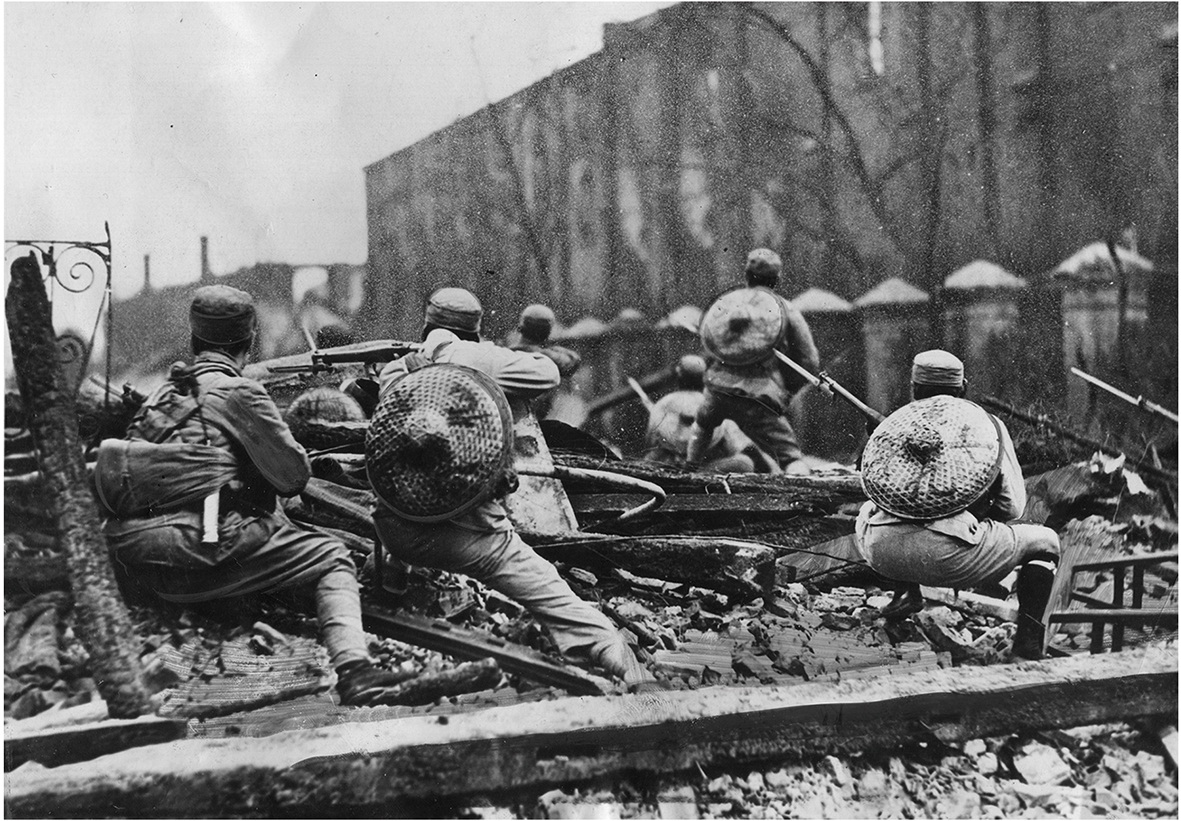
January 28 incident
The January 28 incident or Shanghai incident (January 28 – March 3, 1932) was a conflict between the Republic of China and the Empire of Japan. It took place in the Shanghai International Settlement which was under international control. Japanese army officers, defying higher authorities, had provoked anti-Japanese demonstrations in the International Settlement following the Japanese invasion of Manchuria. The Japanese government sent militant ultranationalist Japanese Buddhist priests belonging to the Nichiren sect to Shanghai. The monks shouted anti-Chinese, pro-Japanese nationalist slogans in Shanghai, promoting Japanese rule over East Asia.[4] In response, a Chinese mob formed killing one monk and injuring two.[4] In response, the Japanese in Shanghai rioted and burned down a factory, killing two Chinese.[4] Heavy fighting broke out, and China appealed with no success to the League of Nations. A truce was finally reached on May 5, calling for Japanese military withdrawal, and an end to Chinese boycotts of Japanese products. It is seen as the first example of a modern war waged in a large city between two heavily equipped armies and as a preview of what was to come during the Second World War.[5]
"Shanghai Incident" redirects here. For the 1937 conflict known as Second Shanghai incident, see Battle of Shanghai.Internationally, the episode intensified opposition to Japan's aggression in Asia. The episode helped undermine civilian rule in Tokyo; Prime Minister Inukai Tsuyoshi was assassinated on May 15, 1932.[6]
Naming[edit]
In Chinese literature it is known as the January 28 incident (simplified Chinese: 一·二八事变; traditional Chinese: 一·二八事變; pinyin: Yī Èrbā Shìbiàn), while in Western sources it is often called the Shanghai War of 1932 or the Shanghai incident. In Japan it is known as the First Shanghai Incident (Japanese: 第一次上海事変), alluding to the Second Shanghai Incident, which is the Japanese name for the Battle of Shanghai that occurred during the opening stages of the Second Sino-Japanese War in 1937.
Background[edit]
After the Mukden Incident, Japan had acquired control over Manchuria and would eventually establish the puppet government of Manchukuo. However, the Japanese military planned to increase Japanese influence further, especially into Shanghai, where Japan, along with the various western powers, had extraterritorial rights. On January 18, five Japanese Buddhist monks, members of an ardently nationalist sect, shouted anti-Chinese slogans, and were beaten near Shanghai's Sanyou Factory (simplified Chinese: 三友实业社; traditional Chinese: 三友實業社; pinyin: Sānyǒu Shíyèshè) by agitated Chinese civilians.[4] Two were seriously injured, and one died.[4][7] Over the next few hours, a Japanese group burnt down the factory, killing two Chinese in the fire.[4][7]
One policeman was killed and several more hurt when they arrived to quell the disorder.[7] This caused an upsurge of anti-Japanese and anti-imperialist protests in the city and its concessions, with Chinese residents of Shanghai marching onto the streets and calling for a boycott of Japanese-made goods.
Aftermath[edit]
After the ceasefire was brokered, the 19th Army was reassigned by Chiang Kai-shek to suppress the Chinese Communist insurrection in Fujian. After winning some battles against the Communists, a peace agreement was negotiated. On November 22, the leadership of the 19th Route Army revolted against the Kuomintang government, and established the Fujian People's Government, independent of the Republic of China. This new government was not supported by all elements of the Communists and was quickly crushed by Chiang's armies in January 1934. The leaders of the 19th Route Army escaped to Hong Kong, and the rest of the army was disbanded and reassigned to other units of the National Revolutionary Army.
Yoshinori Shirakawa, the commander of the Shanghai Expeditionary Army and joint leader of the Japanese forces, was severely wounded by Korean nationalist Yoon Bong-Gil during a birthday celebration for Emperor Hirohito held at Shanghai's Hongkou Park and died of his injuries on May 26.